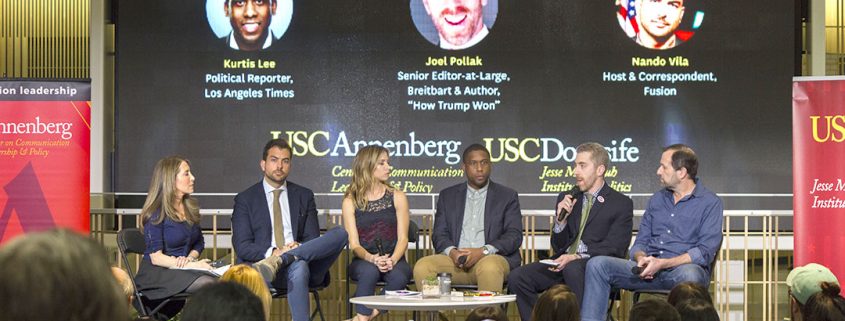Journalists discuss Trump’s effect on media
With comments and tweets from President Donald Trump regarding fake news, and claims that “FAKE NEWS media knowingly doesn’t tell the truth,” the discussion of the role of the press in the United States has become a contested one.
A panel addressed the role of the media in politics today at the Wallis Annenberg Hall Tuesday night. The event was hosted by the Jesse M. Unruh Institute of Politics and the Annenberg Center on Communication Leadership and Policy.
Jessica Yellin, the former CNN Chief White House Correspondent, moderated a panel made up of five members of the media: Kurtis Lee, a political reporter for the Los Angeles Times; Joel Pollak, the senior editor-at-large at Breitbart News; Nando Vila, vice president of programming for Fusion; Hannah Cranston, host and executive producer of the Young Turks’ Think Tank; and Ken LaCorte, founder of LaCorte News and former senior vice president of FoxNews.com.
The conversation began with a discussion on how political reporting has changed since Trump’s election and about the meaning and role of fake news.
Cranston said that because the audience of The Young Turks tends to be younger, the information she shares typically breaks down what is happening in the political world.
“My challenge has been not only giving the information to them, but also creating a precedent and understanding for how they approach media and how they approach what’s going on in the world,” Cranston said. “I am trying to not only explain what is going on in the political atmosphere, but also trying to impart a sense of empathy and accountability that is really difficult when the person in the highest seat in the country is not providing an example of that.”
Along with the discussion on the differences of audience ages, LaCorte said that news has become polarized because of social media.
“We have a little bit of a danger of being allowed to live in our own little bubbles of social media where people get very distinct news just reaffirming what you want to hear,” LaCorte said. “I find it fascinating, but [I’m] not quite sure where it’s headed.”
Pollak said that reporting has not changed since Trump’s election and the beginning of his presidency.
“I just think that the media are more of a monoculture than they once were and so they’re confronting the president in a way that conservatives maybe confronted [former President] Barack Obama, questioned things he said and comments he made,” Pollak said. “It’s not that strange for presidents to say odd things or to break promises or to overstate the case for their point of view or whatever. The difference is that so many of the journalists over the past decade were used to a different kind of relationship with the president.”
After the moderated discussion, the panel opened up to questions from the audience. People asked about the validity of mainstream media and the importance of media literacy.
Raphael Krigel, a junior majoring in communication, asked Pollak about the role Breitbart News played in the growing racist movements in the United States. Pollak responded that Breitbart had nothing to do with the movements.
“Some people in that movement were drawn to Donald Trump for the wrong reasons, just like there were some people drawn to Barack Obama for the wrong reasons,” Pollak said.
Krigel said that Pollak’s response was what he expected.
“It’s kind of avoiding the issue, which is the fact that these racist movements are absolutely on the rise and the data is showing that,” Krigel said. “[Breitbart] is absolutely associated with the movement he represents and the movement our president represents and that’s extremely troubling.”
However, Krigel said that he was glad to have the opportunity to listen to a different perspective.
“I’m glad Annenberg is putting together events with a really diverse panel,” Krigel said. “It’s important that we open our ears and open our minds and really listen to each other, especially in a time when the country is so divided.”

